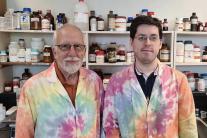Biology PhD Student Awarded NASA Research Fellowship
Tue, 04/25/2023 - 5:34pmOur biology PhD student Nicholas Miklave has been awarded a NASA Space Technology Graduate Research Opportunity (NSTGRO) Fellowship to support his research concerning the optimization of novel synthetic substrates for plant growth in space. Nick's research will be funded by a NSTGRO grant providing up to $84,000 annually. This funding will support research supplies, tuition and fees, a stipend, and travel costs. The award period starts August 1st, 2023, and has a 1-year duration that is renewable for up to a total of 4 years. Nick's PhD advisor, Professor Karl H. Hasenstein of our biology department, will serve as Principal Investigator on the grant. Nick will be assigned a research collaborator from a NASA Center and will have the opportunity to work with the collaborator as a visiting technologist.
Current experiments studying plant growth in microgravity use a granular clay aggregate to control the distribution of water and oxygen in the root zone as well as providing sufficient nutrients. However, this material is known to have a highly variable chemical structure and has been documented to negatively impact the development of plants when compared with typical agricultural conditions. Nick's research project aims to develop a synthetic rooting substrate that maintains good water and oxygen availability in microgravity to replace the clay aggregates currently in use on the International Space Station. Since these substrates can be synthesized in a lab setting, the chemical composition can then be optimized for increased crop yield, nutrient and mineral content, and reusability/biodegradability. Based on hydrogel soil amendments currently used in the agricultural industry, these synthetic substrates can also significantly reduce the payload mass and storage requirements when expanding space-based agriculture from experimental to food-supply scales.
The NASA Space Technology Graduate Research Opportunity (NSTGRO) is a fellowship program that funds the development of groundbreaking, high-risk/high-payoff, low readiness-level space technology. NSTGRO Fellows are assigned a research collaborator from a NASA Center and have the opportunity to work with them as a visiting technologist. Through the visiting technologist experience, Fellows will have the opportunity to work collaboratively with leading engineers and scientists in their chosen area of research and directly disseminate their results within the NASA technical community.

